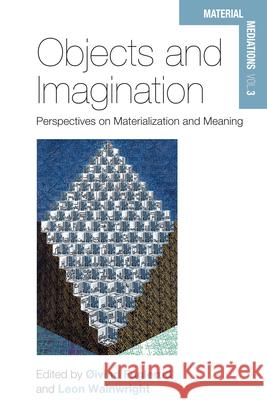Objects and Imagination: Perspectives on Materialization and Meaning » książka
Objects and Imagination: Perspectives on Materialization and Meaning
ISBN-13: 9781782385660 / Angielski / Twarda / 2015 / 270 str.
Objects and Imagination: Perspectives on Materialization and Meaning
ISBN-13: 9781782385660 / Angielski / Twarda / 2015 / 270 str.
(netto: 481,16 VAT: 5%)
Najniższa cena z 30 dni: 498,70
ok. 22 dni roboczych.
Darmowa dostawa!
"The volume offers a valuable new addition to recent publications on material culture by introducing the concept of the imaginary as a framework for the study of objects...With a variety of case studies in different regional settings it deals with the 'enchantment of materiality' (Naguib in the volume), the meaningfulness of objects, their sensual and emotional capacities, and the negotiation of value in their representation or movement across cultural regimes." - Barbara Plankensteiner, Weltmuseum Wien Despite the wide interest in material culture, art, and aesthetics, few studies have considered them in light of the importance of the social imagination - the complex ways in which we conceptualize our social surroundings. This collection engages the "material turn" in the arts, humanities, and social sciences through a range of original contributions on creativity in diverse global and contemporary social settings. The authors engage with everyday objects, art, rituals, and ethnographic exhibitions to analyze the relationship between material culture and the social imagination. What results is a better understanding of how the material embodies and influences our idea of the social world. Oivind Fuglerud is professor of social anthropology at the Museum of Cultural History, University of Oslo. His research interests include Diaspora formations, politics of cultural representation and aesthetics. He has published a number of works on the conflict in Sri Lanka and its consequences, including Life on the Outside - the Tamil Diaspora and Long-Distance Nationalism (Pluto Press 1999). Leon Wainwright is Kindler chair in Global Contemporary Art at Colgate University, New York and Reader in art history at the Open University, UK. He is also Editor-in-Chief of the Open Arts Journal. His publications include Timed Out: Art and the Transnational Caribbean (Manchester University Press, 2011) and numerous writings on modern and contemporary histories of art and global change. He is a recipient of the Philip Leverhulme Prize for the history of art.
"The volume offers a valuable new addition to recent publications on material culture by introducing the concept of the imaginary as a framework for the study of objects...With a variety of case studies in different regional settings it deals with the enchantment of materiality (Naguib in the volume), the meaningfulness of objects, their sensual and emotional capacities, and the negotiation of value in their representation or movement across cultural regimes." · Barbara Plankensteiner, Weltmuseum Wien
Despite the wide interest in material culture, art, and aesthetics, few studies have considered them in light of the importance of the social imagination - the complex ways in which we conceptualize our social surroundings. This collection engages the "material turn" in the arts, humanities, and social sciences through a range of original contributions on creativity in diverse global and contemporary social settings. The authors engage with everyday objects, art, rituals, and ethnographic exhibitions to analyze the relationship between material culture and the social imagination. What results is a better understanding of how the material embodies and influences our idea of the social world.
Øivind Fuglerud is professor of social anthropology at the Museum of Cultural History, University of Oslo. His research interests include Diaspora formations, politics of cultural representation and aesthetics. He has published a number of works on the conflict in Sri Lanka and its consequences, including Life on the Outside - the Tamil Diaspora and Long-Distance Nationalism (Pluto Press 1999).
Leon Wainwright is Kindler chair in Global Contemporary Art at Colgate University, New York and Reader in art history at the Open University, UK. He is also Editor-in-Chief of the Open Arts Journal. His publications include Timed Out: Art and the Transnational Caribbean (Manchester University Press, 2011) and numerous writings on modern and contemporary histories of art and global change. He is a recipient of the Philip Leverhulme Prize for the history of art.











